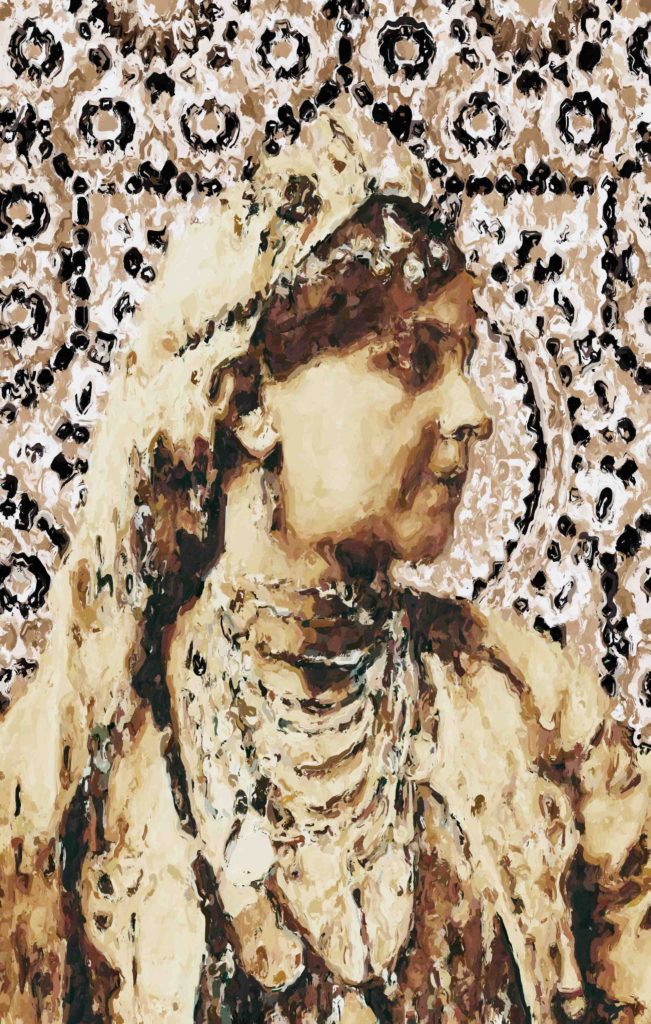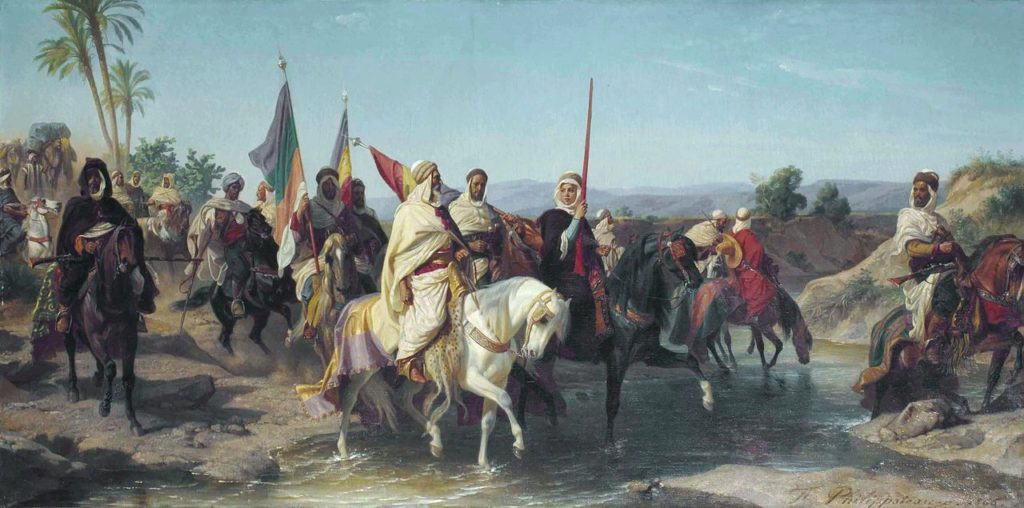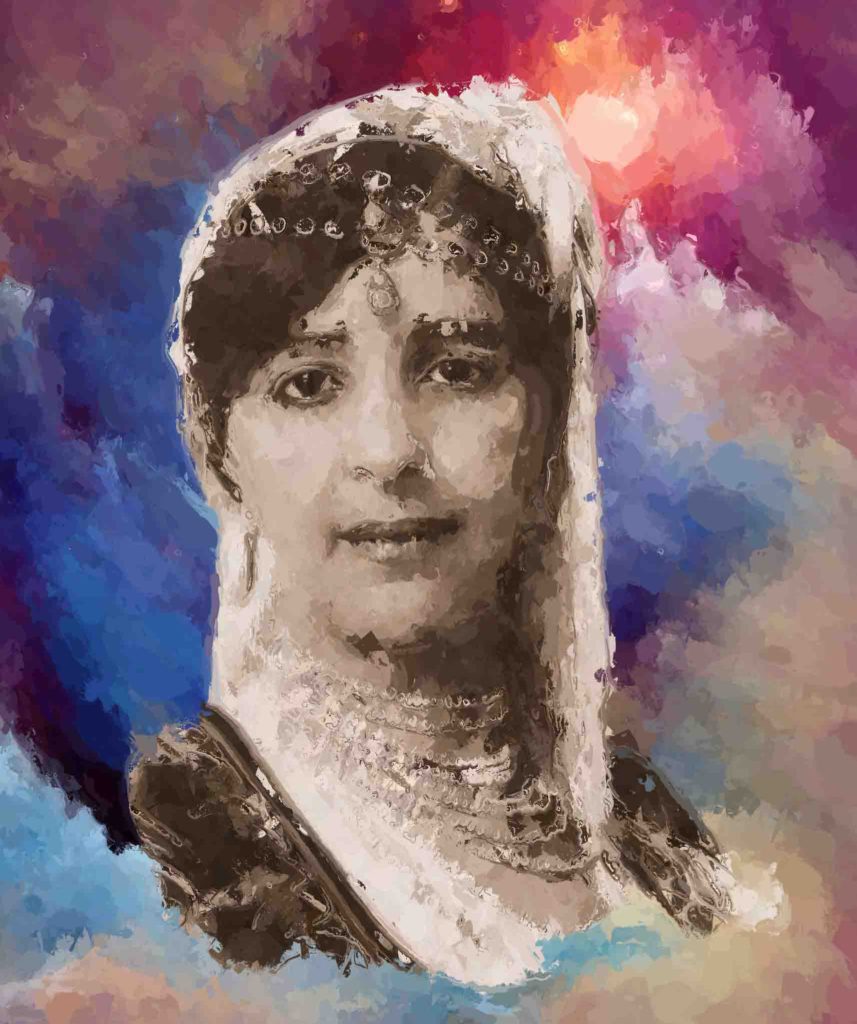She will have taught us honour.
She laughs, hair in winds, bare feet in blood, pacing the roads and steep paths of her dear Kabylie, she laughs. Encircled by the enemy, betrayed and forced to surrender to preserve the life of her hurt people, she laughs. Ultimate symbol of her resistance, her bravery and of her greatness, she still laughs.
Berber, free and resistant woman, she has marked us by her fight against the French occupation but also by the fact that she was simply a woman, standing up for the freedom of her community, Lalla Fatma N’soumer will forever remain in our minds by her courage and the battle that she did for the Algerian history.

Illustration by @Jawadozz all rights reserved.
Wild, she will inspire men and women by taking the arms and leading on the battle field, especially during the battle of Haut Sebaou in 1854. Only aged of 24 years old, she forced the respect towards her from both two sides, the people that she was fighting for and from the enemies.
At the head of 7000 men, her strategy talent will show up during multiples battles for the freedom, the people, for the country. Her name and history will blare across all the Kabylie and be sung by the feet of olive trees.

Félix Philippoteaux
Due to her status of warrior resisting against the invader by her courage and determination but also by her religious education, Lalla Fatma N’soumer will impose herself during the ruling assemblies of the Kabyle rebellion, traditionally reserved for men. Her big influence on the military and politico religious sphere, will dray the way of the emancipation of the woman in Algeria but also In North Africa. In the vanguard of contemporary feminist movements, she succeeds in infringing the norms of the Kabyle patriarchal society.
Worthy and proud, parried with imposing Berber jewelry, Lalla Fatma N’soumer fills the space of almost a mystical aura. Believed to be a healer because of her ancestor, the marabou Ahmed Ou Meziane, she gave advices to people coming from all over the region. It is also said that she had the capacity to predict the future what adds to legendary character.
Her resistance to the invader, her patriotism and bravery makes her one of the famous Algerian women, just like princess Tinhinane, leader of the Hoggar tribes, or Kahina Dihya the warrior, but also like Fatma Tazoughert, priestess and queen of the Aurès; and later the countless heroines of the liberation war, among among whom Hassiba Ben Bouali, Djamila Bouhired and other less heroic Moudjahidates stayed in the shadow of History.

Illustration by @Jawadozz all rights reserved.
At the end of a persevered struggle, in numerical inferiority, driven back, she will take refuge in the village of Takhlijt Aït Aatsou where she will later be arrested by the troops of the marshal Randon, which will give her the title of “Jeanne d’Arc du Djurdjura”. Lalla Fatma N’soumer, fierce look and haughty harbour, will proclaimed about the Djurdjura “these mountains taught us honour”.
Lalla Fatma N’soumer, a destiny of woman. A destiny of a Kabyle, Amazigh, Algerian, African, but also a woman of the world. A glorious destiny full of sacrifices. She will have taught us honour.
Translated by: Souheila El Abassi
Elle rit. Cheveux aux vents, nus pieds en sang, arpentant les routes et sentiers escarpés de sa Kabylie bien aimée, elle rit. Encerclée par l’ennemi, trahie, forcée à se rendre pour préserver la vie de son peuple meurtri, elle rit. Ultime symbole de sa résistance, de sa bravoure et de sa grandeur, elle rit.
Berbère, femme libre, résistante, à la fois contre l’occupant français mais également du fait de sa condition de femme, Lalla Fatma N’soumer marquera par son courage et sa bravoure l’Histoire de l’Algérie.

Illustration by @Jawadozz All rights reserved.
Farouche, elle inspirera femmes et hommes en prenant les armes et en menant la charge sur le champ de bataille, notamment au cours de la bataille du Haut Sebaou en 1854, où, alors âgée de 24 ans, elle força le respect des deux camps de par sa force et son courage. A la tête de 7000 hommes, ses talents de stratège se révéleront au cours de ses nombreux combats pour la liberté, pour le peuple, pour la patrie. L’écho de sa bravoure retentira à travers toute la Kabylie et ses louanges, chantées aux pieds de maints oliviers, résonnent aujourd’hui encore.
En raison de son statut de guerrière résistante à l’envahisseur, de part son courage, sa détermination, sa forte personnalité et son éducation religieuse, Lalla Fatma N’soumer s’imposera dans les assemblées dirigeantes de la rébellion kabyle, traditionnellement réservées aux hommes. Sa grande influence sur la sphère militaire et politico-religieuse de l’époque tracera le chemin de l’émancipation de la femme en Algérie et en Afrique du nord. A l’avant-garde des mouvements féministes contemporains, elle réussit à transgresser les normes de la société kabyle patriarcale.

Félix Philippoteaux
Digne et fière, parée d’imposants bijoux berbères, Lalla Fatma N’soumer emplit l’espace de son aura quasi-mystique. Prophétesse, disait-on grâce à sa lignée descendant du marabout Ahmed Ou Meziane, elle prodiguait conseils aux personnes venues des quatre coins de la région. On lui prêtait la capacité à guérir la maladie et à prédire l’avenir, ce qui en ajoute à son caractère légendaire.
Sa résistance à l’envahisseur, son patriotisme et sa bravoure en font une des femmes algériennes illustres, à l’image de Tinhinane chef des tribus du Hoggar, la Kahina Dihya la guérrière, Fatma Tazoughert prêtresse et reine des Aurès ; et plus tard les innombrables héroïnes de la guerre de libération dont Hassiba Ben Bouali, Djamila Bouhired et autres moudjahidates non moins héroïques restées dans l’ombre de l’Histoire.

Illustration by @Jawadozz all rights reserved.
A l’issue d’une lutte acharnée, en infériorité numérique, acculée, elle se réfugie dans le village de Takhlijt Aït Aatsou où elle sera plus tard arrêtée par les troupes du maréchal Randon, qui la surnommera alors « la Jeanne d’Arc du Djurdjura ». Lalla Fatma N’soumer insoumise, le regard féroce et le port altier, clamera au sujet de ce même Djurdjura « ces montagnes nous ont appris l’honneur ».
Lalla Fatma N’soumer. Un destin de femme. Un destin de femme kabyle, amazigh, algérienne, africaine, universelle. Un destin glorieux pavé de sacrifices. Elle nous aura appris l’honneur.


